IRONY
US condemns use of violence against those protesting 'foreign influence' bill in Georgia
'We condemn the use of violence against peaceful protests, including against journalists covering the demonstrations,' says State Department spokesman
2/05/2024 Thursday
AA
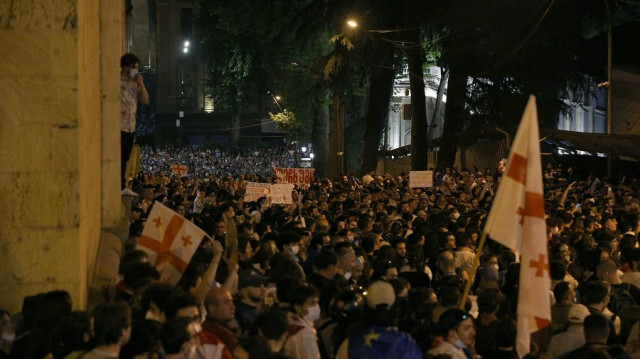
The US on Wednesday condemned a “foreign influence” bill advanced in Georgia's parliament and the use of violence against those protesting against it.
"Members of the ruling party have been clear that the intent of the law is to silence critical voices and destroy Georgia's vibrant civil society, which serves as a critical check on government in any democratic nation," State Department spokesman Matthew Miller said in a statement, describing the bill as “Kremlin-inspired.”
"This legislation and Georgian Dream's anti-Western rhetoric put Georgia on a precarious trajectory. The statements and actions of the Georgian government are incompatible with the democratic values that underpin membership in the EU and NATO and thus jeopardize Georgia's path to Euro-Atlantic integration," he added.
Miller also condemned the narrative that government officials have adopted to defend the bill, adding that such comments "mischaracterizing" foreign assistance in Georgia undermine the “strong relations” between the US and the government and people of Georgia.
"We stand with the Georgian people and their right to have their voices heard. We condemn the use of violence against peaceful protests, including against journalists covering the demonstrations," he said.
The Georgian parliament voted in support of the controversial "foreign influence" bill on Wednesday amid ongoing protests in the capital Tbilisi.
The bill, presented to parliament by the ruling Georgian Dream party, requires organizations including media outlets that receive more than 20% of their funding from abroad to register with the state registry. It also obliges them to publish annual financial reports.
Security forces in the former Soviet republic intervened using tear gas and water cannons against demonstrators on Wednesday who were attempting to besiege parliament while protesting against the controversial bill.
More clashes between police and protestors in Tbilisi as government pushes through "foreign agents law"
2 MAY 2024
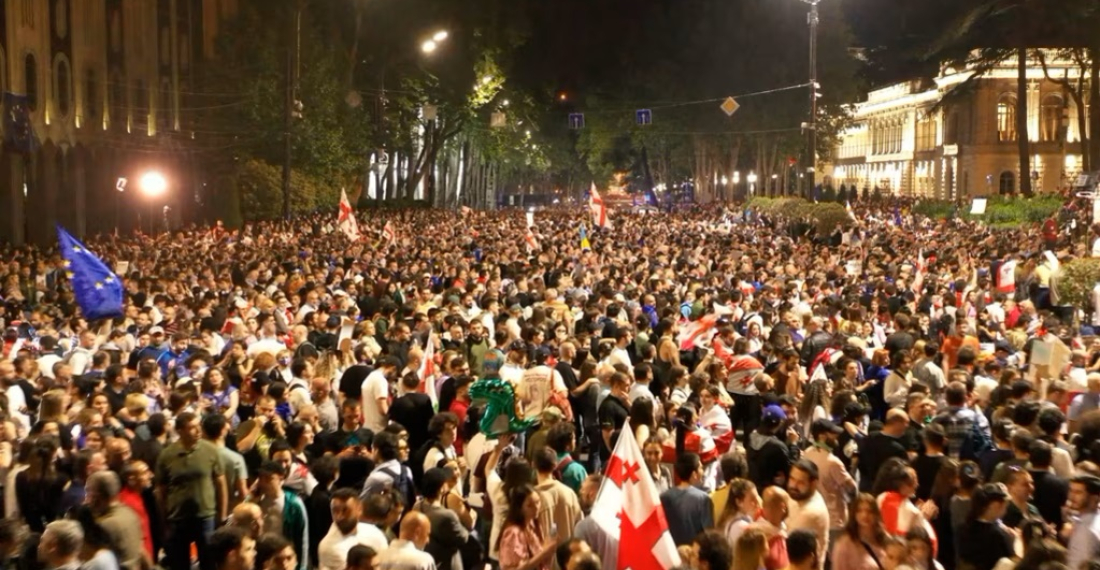
On May 1, the Georgian government passed through Parliament the controversial “Foreign Agents Law” in its second reading with 83 votes in favor and 23 against, despite strong opposition from international partners, large segments of Georgian society and opposition MPs and politicians. Outside parliament massive public protests saw clashes between police and protestors
President of Georgia Salome Zurabishvili addressed the protesters in the evening of May 1, when the situation on Chitadze Street, by the gate of the parliament, became tense as several youths tried to break through the closed gates into the yard of the parliament. She said she stands by the protesters’ side. She called the rallies “extraordinary” saying that the whole world is watching Georgians demonstrate the attitude, determination, and perseverance. She said these qualities are important in order to win in the long term struggle, the final stage of which will be the Parliamentary elections, which “will show that Georgia will never be Russia.”
Salome Zurabishvili addressed the youth “with flame in their hearts” as she called them, saying that “some things are not necessary” and appealed “to leave along the gates of the Parliament” saying that “nothing happens there”. Noting that “our struggle” is no longer about the Foreign Agents Law”, she said that the longer-term struggle is about the elections” and about “all the laws that this government has passed that distance us from the EU”. That is the goal, she stressed.
Noting that it’s Holy Week, she appealed for peaceful protests and to avoid provoking violence, saying: “We will show the world what Georgia and its youth can do.”
source: commonspac
Georgia parliament cancels session after building damaged during huge protests
Thousands continued to protest late Wednesday evening in the Georgian capital of Tbilisi as the country’s Parliament moved closer to adopting a controversial law that critics fear will stifle media freedom and endanger the country’s European Union membership bid.
May 2, 2024
TBILISI, Georgia (AP) — The parliament of Georgia cancelled its Thursday plenary session following massive protests against a proposed law that critics fear will stifle media freedom and endanger the country’s bid for membership in the European Union.
The parliament’s announcement said the cancellation was connected to damage the building suffered during Wednesday protests in which police used water cannon, tear gas and pepper spray against the tens of thousands of demonstrators.
The legislature on Wednesday approved a second reading of the bill that would require media and non-commercial organizations to register as “pursuing the interests of a foreign power” if they receive more than 20% of funding from abroad.
The third and final reading was expected in mid-May and it was not clear if the cancellation of Thursday’s session would affect the bill’s progress. The ruling Georgian Dream party withdrew a similar proposal last year after large crowds protested.
Protesters denounce the bill as “the Russian law” because neighboring Russia uses similar legislation to stigmatize independent news media and organizations critical of the Kremlin.
Eighty-three of Georgia’s 150 lawmakers approved the bill in its second reading, while 23 voted against it.
Georgian President Salome Zourabichvili, increasingly at odds with the governing party, has criticized the bill and vowed to veto it if it is passed by Parliament. But the governing party can overrule the veto and ask the parliamentary speaker to sign the bill into law.
The EU’s foreign policy arm earlier this month also criticized Georgian Dream’s decision to reintroduce the law, which it said “raises serious concerns” around media freedom in the country — something it called “crucial for the EU accession process.”
Georgia rocked by clashes over 'foreign agent' bill
By Jaroslav Lukiv and Paul Kirby, BBC News
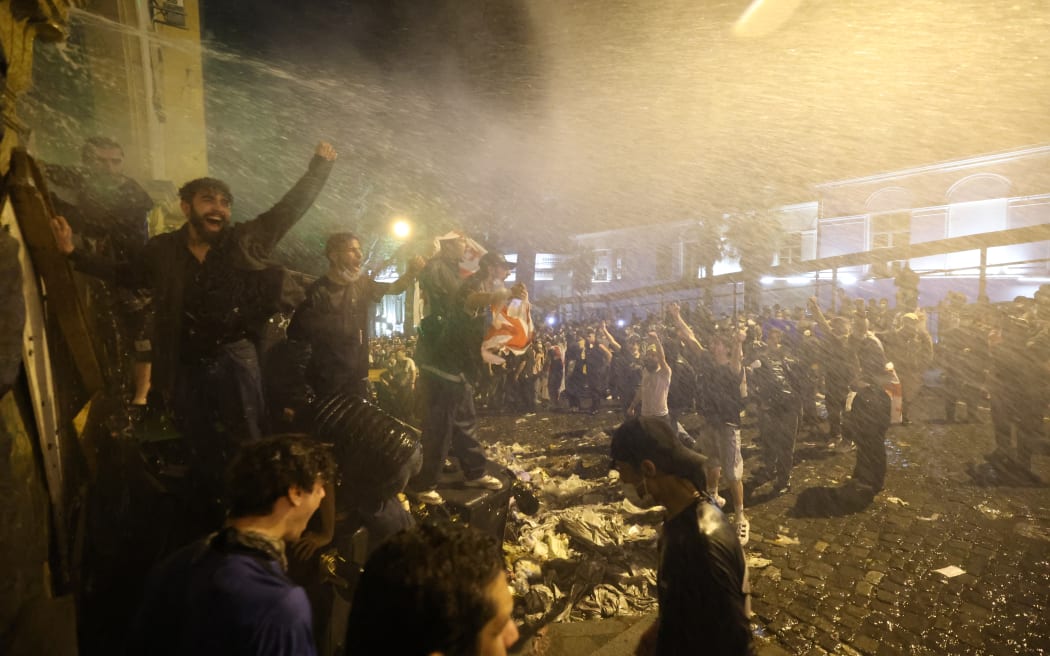
Protesters built a barricade outside Georgia's parliament in a protest against the controversial 'foreign agent' bill. Photo: AFP/Giorgi Arjevanidze
Riot police in Georgia fired tear gas and a water cannon into crowds protesting against a bill seen by the opposition as targeting media freedoms.
Thousands waving Georgian and European Union flags gathered outside parliament for a second night to protest what they see as a Russian-inspired law.
MPs approved the second reading of the controversial "foreign agent" bill on Wednesday.
The EU warns it could harm Tbilisi's ambitions of joining the bloc.
European Commission President Ursula von der Leyen said on Wednesday she was following events in Georgia with "great concern". "The Georgian people want a European future for their country. Georgia is at a crossroads. It should stay the course on the road to Europe," she posted on X.
Protesters fear that the proposed foreign influence bill could be used to crush critical voices ahead of parliamentary elections later this year.
Opponents say the measures are inspired by authoritarian legislation that neighbouring Russia uses to crush dissent. The billionaire founder of the governing Georgian Dream party, Bidzina Ivanishvili, claimed this week that a Western "global war" party was using the country as part of its confrontation with Russia.
A similar authoritarian law that came into force in Russia in 2012 has since been used to marginalise voices challenging the Kremlin - including prominent cultural figures, media organisations and civil society groups.
The bill cleared its second reading with a vote of 83 to 23. After a third reading it has to be signed off by President Salome Zurabishvili, who has vowed to veto the bill, although Georgian Dream has sufficient numbers in parliament to overrule her.
The governing party wants the law enacted by the end of the month. Once that happens, organisations would be required to state whether they are funded from abroad.
Georgia has been rocked by weeks of protests over the issue. On Tuesday night, there were similar clashes between police and protesters on Rustaveli Avenue, outside parliament.
Several people were injured, including Levan Khabeishvili, chairman of the main opposition party United National Movement (UNM). He posted a picture of his bruised face on social media and later appeared in parliament, his face heavily bandaged.

Levan Khabeishvili posted a photo of his bruised face on X. Photo: Supplied/Levan Khabeishvili
Eyewitnesses accused some police officers of physically attacking protesters and EU foreign police chief Josep Borrell said he strongly condemned violence against Georgians "who were peacefully demonstrating against the law on foreign influence".
Deputy interior minister Aleksandre Darakhvelidze said six officers were hurt and 63 people arrested and he complained that "the rally turned completely violent". He said Mr Khabeishvili had been hurt while trying to break through a police cordon, although his party said he had been beaten by police
Georgia was granted EU candidate status last December and polls suggest about 80 percent of the population is in favour of joining.
Protests against the bill began in mid-April, with many Georgians fearing the government's measures would derail Georgia from its path towards membership, says the BBC's South Caucasus correspondent, Rayhan Demytrie.
Under the proposals, non-governmental organisations (NGOs) and independent media would be required to register as organisations "bearing the interests of a foreign power", if they receive more than 20 percent of their funding from foreign donors.
They would also be monitored by Georgia's justice ministry and could be forced to share sensitive information - or face hefty fines of up to 25,000 Georgian lari (NZ$15,720).
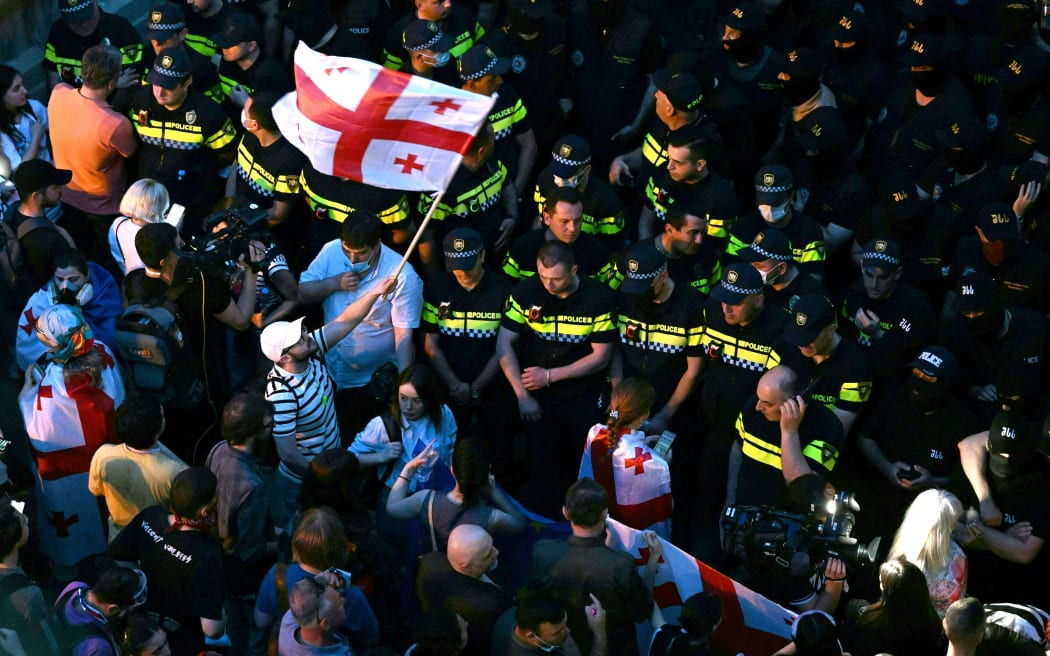
Protesters wave a Georgian flag as they face off with police. Photo: AFP/Vano Shlamov
A number of European leaders have warned the proposed bill is "incompatible" with European norms and values.
But the government of Georgian Prime Minister Irakli Kobakhidze is standing firm.
Mr Kobakhidze has accused NGOs of attempting to stage revolutions in Georgia twice, of promoting "gay propaganda" and of attacking the Georgian Orthodox Church.
The government insists the bill is about ensuring transparency and rejects the notion that it is against European values - or that Russia is behind the legislation.
On Monday, Bidzina Ivanishvili told a rally of Georgian Dream supporters that foreign-funded NGOs threatened Georgian sovereignty and that the opposition UNM would be punished for crimes against the state after this year's elections.
President Zourabichvili, whose role is largely ceremonial, described the pro-government rally as a "Putin-type" event.
Ms Zourabichvili, who is strongly opposed to the foreign influence bill, has appealed to the interior ministry to stop using "disproportionate force" against protesters.
- BBC
By Jaroslav Lukiv and Paul Kirby, BBC News

Protesters built a barricade outside Georgia's parliament in a protest against the controversial 'foreign agent' bill. Photo: AFP/Giorgi Arjevanidze
Riot police in Georgia fired tear gas and a water cannon into crowds protesting against a bill seen by the opposition as targeting media freedoms.
Thousands waving Georgian and European Union flags gathered outside parliament for a second night to protest what they see as a Russian-inspired law.
MPs approved the second reading of the controversial "foreign agent" bill on Wednesday.
The EU warns it could harm Tbilisi's ambitions of joining the bloc.
European Commission President Ursula von der Leyen said on Wednesday she was following events in Georgia with "great concern". "The Georgian people want a European future for their country. Georgia is at a crossroads. It should stay the course on the road to Europe," she posted on X.
Protesters fear that the proposed foreign influence bill could be used to crush critical voices ahead of parliamentary elections later this year.
Opponents say the measures are inspired by authoritarian legislation that neighbouring Russia uses to crush dissent. The billionaire founder of the governing Georgian Dream party, Bidzina Ivanishvili, claimed this week that a Western "global war" party was using the country as part of its confrontation with Russia.
A similar authoritarian law that came into force in Russia in 2012 has since been used to marginalise voices challenging the Kremlin - including prominent cultural figures, media organisations and civil society groups.
The bill cleared its second reading with a vote of 83 to 23. After a third reading it has to be signed off by President Salome Zurabishvili, who has vowed to veto the bill, although Georgian Dream has sufficient numbers in parliament to overrule her.
The governing party wants the law enacted by the end of the month. Once that happens, organisations would be required to state whether they are funded from abroad.
Georgia has been rocked by weeks of protests over the issue. On Tuesday night, there were similar clashes between police and protesters on Rustaveli Avenue, outside parliament.
Several people were injured, including Levan Khabeishvili, chairman of the main opposition party United National Movement (UNM). He posted a picture of his bruised face on social media and later appeared in parliament, his face heavily bandaged.

Levan Khabeishvili posted a photo of his bruised face on X. Photo: Supplied/Levan Khabeishvili
Eyewitnesses accused some police officers of physically attacking protesters and EU foreign police chief Josep Borrell said he strongly condemned violence against Georgians "who were peacefully demonstrating against the law on foreign influence".
Deputy interior minister Aleksandre Darakhvelidze said six officers were hurt and 63 people arrested and he complained that "the rally turned completely violent". He said Mr Khabeishvili had been hurt while trying to break through a police cordon, although his party said he had been beaten by police
Georgia was granted EU candidate status last December and polls suggest about 80 percent of the population is in favour of joining.
Protests against the bill began in mid-April, with many Georgians fearing the government's measures would derail Georgia from its path towards membership, says the BBC's South Caucasus correspondent, Rayhan Demytrie.
Under the proposals, non-governmental organisations (NGOs) and independent media would be required to register as organisations "bearing the interests of a foreign power", if they receive more than 20 percent of their funding from foreign donors.
They would also be monitored by Georgia's justice ministry and could be forced to share sensitive information - or face hefty fines of up to 25,000 Georgian lari (NZ$15,720).

Protesters wave a Georgian flag as they face off with police. Photo: AFP/Vano Shlamov
A number of European leaders have warned the proposed bill is "incompatible" with European norms and values.
But the government of Georgian Prime Minister Irakli Kobakhidze is standing firm.
Mr Kobakhidze has accused NGOs of attempting to stage revolutions in Georgia twice, of promoting "gay propaganda" and of attacking the Georgian Orthodox Church.
The government insists the bill is about ensuring transparency and rejects the notion that it is against European values - or that Russia is behind the legislation.
On Monday, Bidzina Ivanishvili told a rally of Georgian Dream supporters that foreign-funded NGOs threatened Georgian sovereignty and that the opposition UNM would be punished for crimes against the state after this year's elections.
President Zourabichvili, whose role is largely ceremonial, described the pro-government rally as a "Putin-type" event.
Ms Zourabichvili, who is strongly opposed to the foreign influence bill, has appealed to the interior ministry to stop using "disproportionate force" against protesters.
- BBC
Tens of Thousands Rally in Georgia Against ‘Foreign Influence’ Bill
05/02/24
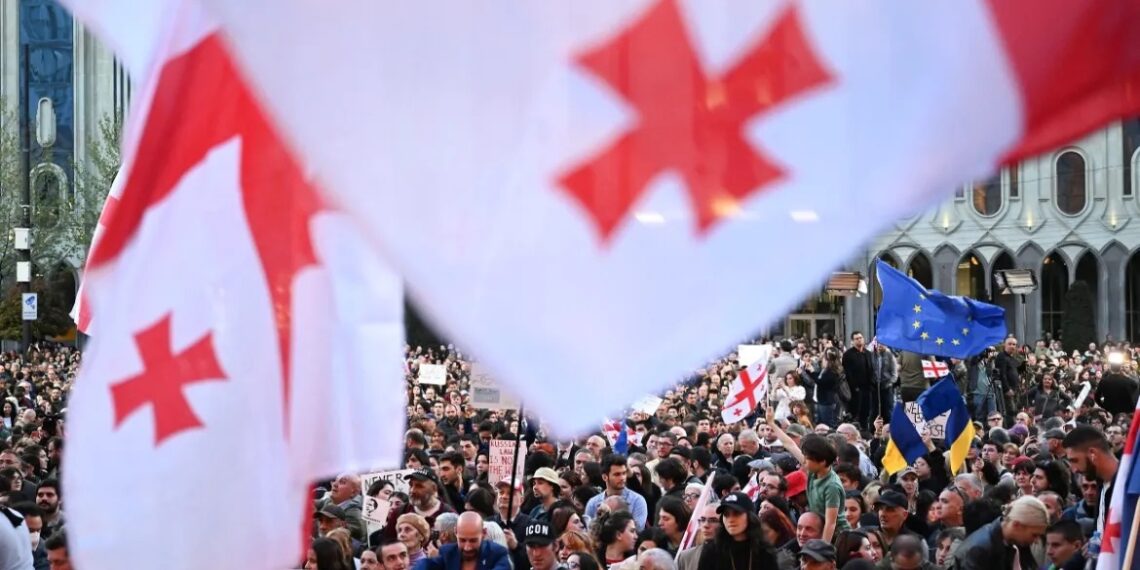
People protest against the 'foreign agents' bill outside parliament in Georgia's capital, Tbilisi. Photo: Vano Shlamov/AFP
Tens of thousands of people rallied Wednesday in Georgia against a controversial “foreign influence” bill, after parliament advanced the measure that Brussels has warned would harm Tbilisi’s long-standing European aspirations.
The Black Sea Caucasus nation has been gripped by mass anti-government protests since April 9, after the ruling Georgian Dream party reintroduced plans to pass a law, which critics say resembles repressive Russian legislation used to silence dissent.
The bill cleared its second reading in parliament on Wednesday with a vote of 83 to 23, a day after police violently broke up a demonstration against it, firing tear gas, water cannon, and rubber bullets, and beating and arresting scores of people.
EU chief Ursula von der Leyen condemned the violence and urged Georgia to stay on the path to Europe.
“I am following the situation in Georgia with great concern and condemn the violence on the streets of Tbilisi,” von der Leyen wrote on social media platform X.
“The Georgian people want a European future for their country. Georgia is at a crossroads. It should stay the course on the road to Europe.”
Waving Georgian and European Union flags, tens of thousands of demonstrators gathered on Wednesday evening outside parliament, according to an AFP reporter on the scene. Georgia’s national anthem and the EU’s “Ode to Joy” were performed at the rally.
‘Popular Anger Growing’
Later in the evening, police used pepper spray, tear gas, and water cannons from inside the courtyard of the parliament building against hundreds of demonstrators who attempted to block the legislature’s side entrance.
Parliament said in a statement that it had “activated the red level of security due to the attack on the parliament building, which poses a threat to the lives and health” of those inside.
“Their senseless violence is futile — the protest will only grow as popular anger is growing against our government,” protester Tato Gachechiladze, 20, told AFP.
“Georgia belongs to Europe and we will not tolerate Russian laws and a pro-Russian government,” he added.
An AFP reporter at the scene said there were no attempts to attack the building, except when a group of youths shook its massive gate.
The interior ministry said police had used “special means provided by the law — pepper spray and water cannons — in order to restore law and order.”
Prime Minister Irakli Kobakhidze criticized Western politicians and diplomats for “slandering” the bill, which will only “boost transparency of NGO’s foreign funding in accordance with European values.”
He accused Georgian civil groups of trying to stage revolutions “at least twice in the last three years” with Western funding.
Coveted EU Candidacy
A mass anti-government rally was also held in Georgia’s second-largest city of Batumi, independent TV station Formula reported.
The turmoil comes ahead of parliamentary elections in October, seen as a key test of democracy in the EU-aspiring former Soviet republic.
The ruling Georgian Dream party has defended the bill, saying it aims to sign the measure into law by mid-May.
The bill must pass a third reading and be signed by the president to become law.
President Salome Zurabishvili — who is at loggerheads with the ruling party — is expected to veto the measure, but the party has enough votes for an override.
If adopted, the law would require that any independent NGO and media organization receiving more than 20 percent of its funding from abroad register as an “organisation pursuing the interests of a foreign power.”
The United States said the legislation would put Georgia on a “precarious trajectory.”
“The statements and actions of the Georgian government are incompatible with the democratic values that underpin membership in the EU and NATO and thus jeopardize Georgia’s path to Euro-Atlantic integration,” US State Department Spokesman Matthew Miller said in a statement.
Last year, mass street protests forced Georgian Dream to drop plans for similar measures.
Georgia has sought for years to deepen relations with the West, but Georgian Dream has been accused of attempting to steer the former Soviet republic closer to Russia.
EU chief Charles Michel has said the bill “is not consistent with Georgia’s bid for EU membership” and that it “will bring Georgia further away from the EU and not closer.”
In December, the EU granted Georgia official candidate status but said Tbilisi would have to reform its judicial and electoral systems, reduce political polarisation, improve press freedom, and curtail the power of oligarchs before membership talks are formally launched.
Georgia’s bid for membership of the EU and NATO is enshrined in its constitution and — according to opinion polls — supported by more than 80 percent of the population.
Police In Georgia Use Tear Gas, Water Cannons To Disperse Protesters Outside Of Parliament
May 02, 2024
By RFE/RL's Georgian Service
Police in Tbilisi fired tear gas and water cannons at protesters gathered outside Georgia's parliament on May 1 after a controversial "foreign agent" bill advanced in its second reading. The bill has fueled weeks of demonstrations and warnings from Brussels it could jeopardize Georgia's EU hopes.

1Georgian police used water cannons, tear gas, and batons against demonstrators in the nation's capital, Tbilisi, on May 1 after the legislature advanced a controversial "foreign agent" law. The bill had already fueled weeks of demonstrations, prompting a warning from Brussels that it could jeopardize Georgia's aspirations of joining the European Union.

2Protesters help an injured man during a rally in Tbilisi.
At least 11 people, including six police officers, were receiving hospital treatment after being injured, according to Georgia's Health Ministry.

3Drone footage captured by RFE/RL's Georgian Service shows the massive scale of the latest protests in Tbilisi overnight on May 1.

4A protester draped in a Georgian flag shouts in front of a police cordon.
The protests were a continuation of several weeks of rallies led by opposition parties and activist groups against the parliament’s advancement of the controversial draft law, which was passed in a first reading on April 17.

5In a statement, the U.S. State Department condemned the violence against protesters and the lawmakers' vote, calling it "anti-Western."

6The government withdrew the bill introduced last year due to widespread protests against the proposal. The law would require organizations with foreign funding to register their activities, give the authorities broad oversight powers, and allow criminal penalties for vague infractions.

7The ruling Georgian Dream party announced its plans to reintroduce the bill after a previous version was dropped in 2023. This new version omits the phrase "foreign agent."

8A protester reacts as water cannons and tear gas are sprayed into the crowd.

9A man draped in an EU flag carries an injured protester.
Supporters of the bill say it mirrors similar U.S. legislation and promotes transparency. Opponents say the proposed legislation would stifle dissent and silence independent media. They have compared it to similar legislation in Russia, which is why many call it the "Russian law."

10The final reading of the bill is scheduled to be debated on May 17. Georgian President Salome Zurabishvili told media that she would veto it if it’s approved in its final reading. However, she also said the ruling Georgian Dream party has enough lawmakers to override her decision if she does so.
May 02, 2024
By RFE/RL's Georgian Service
Police in Tbilisi fired tear gas and water cannons at protesters gathered outside Georgia's parliament on May 1 after a controversial "foreign agent" bill advanced in its second reading. The bill has fueled weeks of demonstrations and warnings from Brussels it could jeopardize Georgia's EU hopes.

1Georgian police used water cannons, tear gas, and batons against demonstrators in the nation's capital, Tbilisi, on May 1 after the legislature advanced a controversial "foreign agent" law. The bill had already fueled weeks of demonstrations, prompting a warning from Brussels that it could jeopardize Georgia's aspirations of joining the European Union.

2Protesters help an injured man during a rally in Tbilisi.
At least 11 people, including six police officers, were receiving hospital treatment after being injured, according to Georgia's Health Ministry.

3Drone footage captured by RFE/RL's Georgian Service shows the massive scale of the latest protests in Tbilisi overnight on May 1.

4A protester draped in a Georgian flag shouts in front of a police cordon.
The protests were a continuation of several weeks of rallies led by opposition parties and activist groups against the parliament’s advancement of the controversial draft law, which was passed in a first reading on April 17.

5In a statement, the U.S. State Department condemned the violence against protesters and the lawmakers' vote, calling it "anti-Western."

6The government withdrew the bill introduced last year due to widespread protests against the proposal. The law would require organizations with foreign funding to register their activities, give the authorities broad oversight powers, and allow criminal penalties for vague infractions.

7The ruling Georgian Dream party announced its plans to reintroduce the bill after a previous version was dropped in 2023. This new version omits the phrase "foreign agent."

8A protester reacts as water cannons and tear gas are sprayed into the crowd.

9A man draped in an EU flag carries an injured protester.
Supporters of the bill say it mirrors similar U.S. legislation and promotes transparency. Opponents say the proposed legislation would stifle dissent and silence independent media. They have compared it to similar legislation in Russia, which is why many call it the "Russian law."

10The final reading of the bill is scheduled to be debated on May 17. Georgian President Salome Zurabishvili told media that she would veto it if it’s approved in its final reading. However, she also said the ruling Georgian Dream party has enough lawmakers to override her decision if she does so.
No comments:
Post a Comment